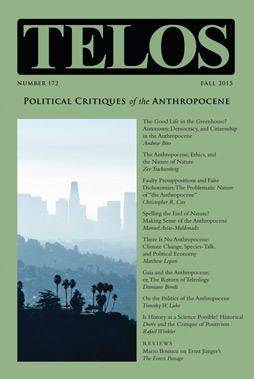Matthew Lepori’s “There Is No Anthropocene: Climate Change, Species-Talk, and Political Economy” appears in Telos 172 (Fall 2015). Read the full version at the Telos Online website, or purchase a print copy of the issue in our store.
 Anthropocene scholars push a new universal history and subject: we (the “anthropos”) are digging our grave as a species. Though this rhetoric is effective for drawing attention to the ecological crisis, the Anthropocene concept is dangerous for social theory. By generalizing responsibility and guilt for our contemporary ecological crisis to the point that it encompasses the human species, the concept and discourse elide the particular people and structures responsible for creating it. Rather than clarify the origins of the contemporary crisis—the history of capitalism, colonialism, and simplistic ideas about nature—it occludes them through forays into “deep history” and tales of technology disembedded from their social context. Lacking this history, the Anthropocene operates as an empty cosmopolitanism. Rather than provide a ground for a new political ecology, the Anthropocene removes it. Worse, the concept may prove useful for global actors who wish to hide their climate debts, using the rhetoric of collective responsibility that the Anthropocene makes possible.
Anthropocene scholars push a new universal history and subject: we (the “anthropos”) are digging our grave as a species. Though this rhetoric is effective for drawing attention to the ecological crisis, the Anthropocene concept is dangerous for social theory. By generalizing responsibility and guilt for our contemporary ecological crisis to the point that it encompasses the human species, the concept and discourse elide the particular people and structures responsible for creating it. Rather than clarify the origins of the contemporary crisis—the history of capitalism, colonialism, and simplistic ideas about nature—it occludes them through forays into “deep history” and tales of technology disembedded from their social context. Lacking this history, the Anthropocene operates as an empty cosmopolitanism. Rather than provide a ground for a new political ecology, the Anthropocene removes it. Worse, the concept may prove useful for global actors who wish to hide their climate debts, using the rhetoric of collective responsibility that the Anthropocene makes possible.



